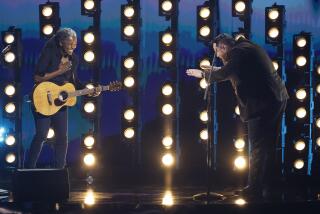Opinión: From Run the Jewels to J. Cole, how today’s musicians carry on Martin Luther King Jr.’s legacy
- Share via
At the recent 2015 Golden Globe Awards, show host Tina Fey delivered one of the most poignant and effective jokes of the evening in regard to the multi-nominated film “Selma,” based on the Dr. Martin Luther King, Jr.-led voting rights march from Selma to Montgomery, Ala., in 1965.
“The movie ‘Selma’ is about the American civil rights movement,” Fey quipped during the opening monologue, “that totally worked and now everything’s fine.”
Nominated in five categories, it was the John Legend and Common song from the film, “Glory,” that would take home “Selma’s” only award that night. “As I got to know the people of the civil rights movement, I realized I am the hopeful black woman who was denied her right to vote. I am the caring white supporter killed on the front lines of freedom. I am the unarmed black kid who maybe needed a hand, but instead was given a bullet. I am the two fallen police officers murdered in the line of duty. ‘Selma’ has awakened my humanity,” Common said in his acceptance speech.
At a time when waves of civil unrest continue to ripple across America in light of Michael Brown’s and Eric Garner’s deaths at the hands of police under what can safely be called murky circumstances, citizens are taking to the streets (and in some cases, popular brunch spots) in protests that have become more common than in years past.
The current state of race relations in America has sparked the world of music to respond in myriad ways, even among some claims that some of the most visible and influential musicians have been mute on the situation.
“I urge and challenge musicians and artists alike to push themselves to be a voice of the times that we live in,” Roots drummer Ahmir “Questlove” Thompson implored via Instagram. “We need new Dylans. New Public Enemys. New Simones. New De La Roachas… Seriously just ONE or Two songs that change the course.”
Rappers such as J. Cole were already there, having penned the moving song, “Be Free” last August after Michael Brown was shot dead by police officer Darren Wilson on the streets of Ferguson, Mo., using a December appearance on “Late Night With David Letterman” to perform the track instead of promoting one from his recently released and chart-topping album, “2014 Forest Hills Drive.” “There ain’t no drink out there that can numb my soul,” he sang in the stirring performance. “All we want to do is take the chains off/All we want to do is be free.”
Reclusive R&B artist D’Angelo was moved to rush-release his long-awaited (more than 14 years long, to be exact) third full-length album, “Black Messiah,” after a grand jury chose not to indict Darren Wilson for Brown’s death. While not overtly political in content, D’Angelo contends in the liner notes that the album is “about people rising up in Ferguson and in Egypt and in Occupy Wall Street and in every place where a community has had enough and decides to make change happen.”
Other artists have taken a more direct and personal approach, none more so than hip-hop super-group Run the Jewels and rapper Michael “Killer Mike” Render in particular. The band was coincidentally booked to perform in St. Louis the same night as the grand jury’s non-indictment, and it hit Render hard. Instead of the group’s show opening to the strains of Queen’s classic rock song, “We Are the Champions,” Render delivered an emotional address to the audience: “I have a 20-year-old son and a 12-year-old son, and I am so afraid for them today,” he admitted while choking back tears.
Render’s passion led him to speak on the situation on CNN as well as pen an op-ed article for Billboard to further amplify the frustration and outrage felt by so many African Americans across the country. “The police are paid by the public and carry a public trust, and they take an oath to protect us as citizens. The police have lost sight of that and must be reminded that we pay them to protect us, not to simply engage and cage us,” he wrote.
Martin Luther King Jr.’s enormous sacrifices for human rights set into motion so much of what we’re seeing on the streets of America today. While the visions of equality he spoke of in his life-changing “I Have a Dream” speech have yet to be fully realized, he was paramount in generating the idea that people can instigate change through unity, in lifting their voices in protest against injustice and oppression, refusing to accept the status quo of institutionalized racism that’s still a part of America’s very fabric.
While a song is not going to end racism in America, music and musicians can inspire people to take matters into their own hands and work toward a better, safer and more just world to live in and leave behind for generations to follow.
Scott T. Sterling is an associate editor with Radio.com. Follow him on Twitter @ststerling
Follow the Opinion section on Twitter @latimesopinion
More to Read
Sign up for Essential California
The most important California stories and recommendations in your inbox every morning.
You may occasionally receive promotional content from the Los Angeles Times.













